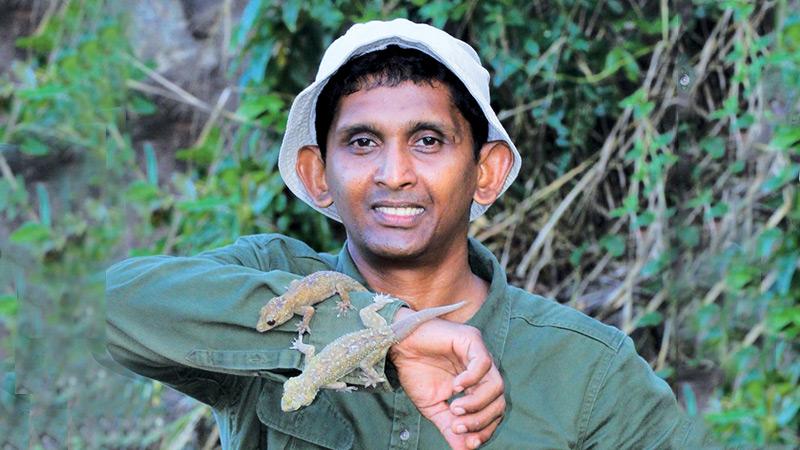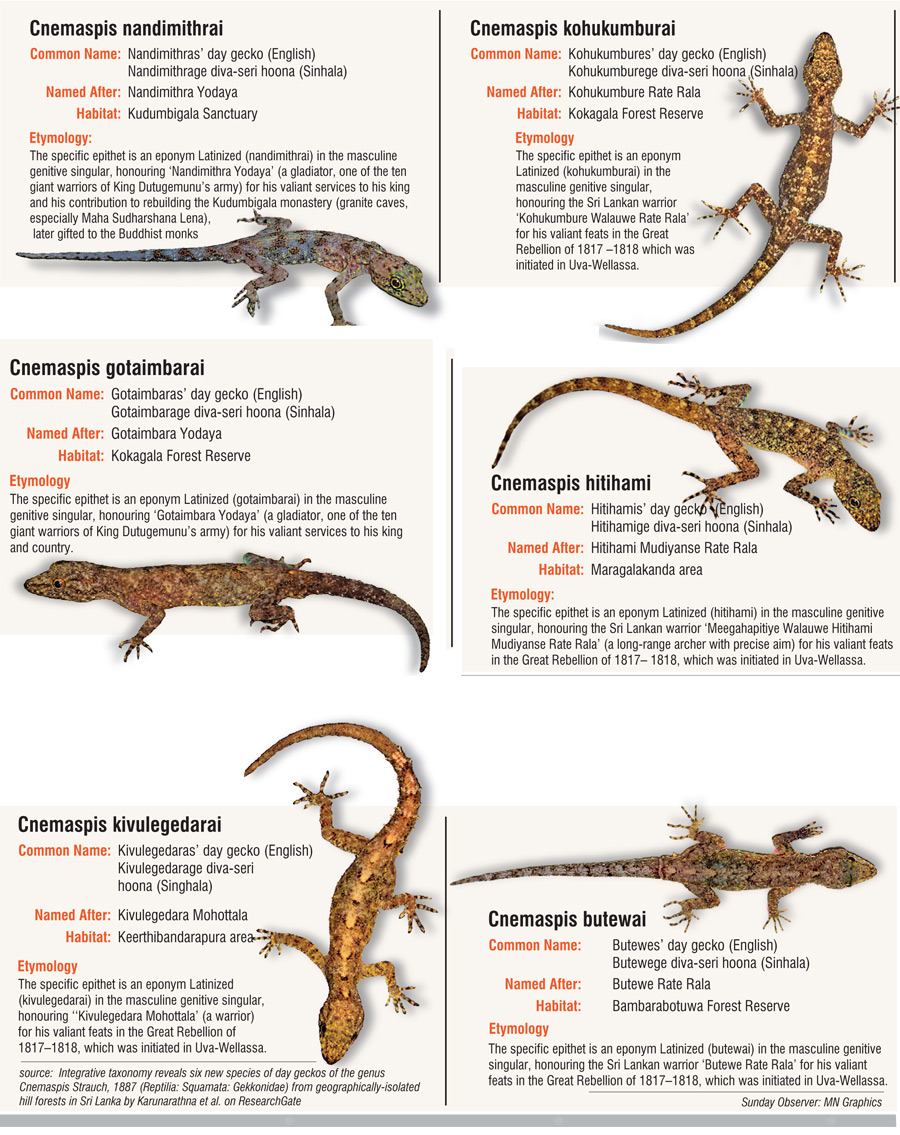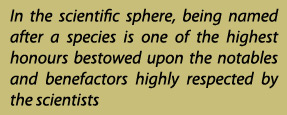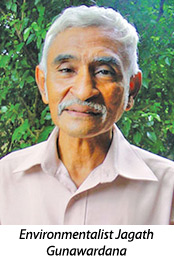
It is believed that approximately two-thirds of the world’s gecko species remain undiscovered by science, with some becoming extinct even before being discovered. The Herculean task of describing and naming the rest of the undiscovered species before they fade into extinction lies with scientists and taxonomists.

Recently, a group of scientists from Sri Lanka described six new species of day geckos new to science, naming them after national heroes. They might have unintentionally stirred up a hornet’s nest, for infuriated by the notion the names carried malicious intentions, the masses unleashed their wrath, with the group of scientists at the epicenter of this maelstrom, for the first time in the history of classification.

 The social media warriors’ battle-cry was heard once more as they questioned the intellect of the scientists in equating the national heroes to geckos. On a Facebook group named Genius Club, an opinion poll was created by a member where the majority voted against the idea of naming newly described species after national heroes. The tragedy lies in the fact that these scientists introduced not one, but six new species to the world, which remains undermined if not forgotten, in the midst of the storm.
The social media warriors’ battle-cry was heard once more as they questioned the intellect of the scientists in equating the national heroes to geckos. On a Facebook group named Genius Club, an opinion poll was created by a member where the majority voted against the idea of naming newly described species after national heroes. The tragedy lies in the fact that these scientists introduced not one, but six new species to the world, which remains undermined if not forgotten, in the midst of the storm.
Animals and plants to honour people
Yet, in the scientific sphere, being named after a species is one of the highest honours, bestowed upon the notables and benefactors highly respected by the scientists. The right to name a species traditionally lies with the person who first describes the new species, subject to a set of rules prescribed by the International Code of Nomenclature, which says the names have to be unique and cannot be rude.
“In the history of classification there is no example of a creature being named to insult someone, which cannot be done under scientific nomenclature, the formal system of naming scientific species. Species of animals and plants are named to honour the people they respect by the scientists, it is a way of immortalising a person’s name,” says Environmentalist and Attorney-at-Law, Jagath Gunawardana, condemning the criticism aimed at the scientists.
In fact, the team of scientists who made the discoveries chose to name the geckos after the national heroes to honour them in memory of their valiant deeds to the country and to ensure that their names do not fade away with time, Herpetologist, Sameera Suranjan Karunaratne who led the team told the Sunday Observer.
Accordingly, the species belonging to the genus (larger group in the hierarchy of classification to which the species belong to) Cnemaspis Strauch were named after Nandimithra Yodaya (Cnemaspis nandimithrai), Gotaimbara Yodaya (Cnemaspis gotaimbarai), Butewe Rate Rala (Cnemaspis butewai), Kivulegedara Mohottala (Cnemaspis kivulegedarai), Kohukumbure Ratey Rala(Cnemaspis kohukumburai) and Hitihami Mudiyanse Ratey Rala (Cnemaspis hitihami).
“These names are already disappearing from memory, if a Sri Lankan is asked to name our heroes only a few will be named. Generations to come will not even know the names of these heroes. However, scientific names are eternal, these names will remain in the global database, Zoobank, the official registry where the names of the new species are included,” he said.
This, according to Karunarathna, will facilitate preserving the deeds of the heroes since the origin of the names given have to be chronicled under the etymology section. He adds that the naming of the day geckos after the heroes already facilitated public discourse on these national heroes who are otherwise “kept in a box”.
Every animal is important
To the scientists, naming a species after someone is by no means a belittling, Karunarathna further said. He gives the frog species named after Weera Puranappu (Pseudophilautus puranappu) as an example.
In 2015, a group of Sri Lankan scientists described a new species of endemic aquatic plant from the Eastern Sinharaja. This, coupled with the fact that it was the first endemic aquatic plant discovered from the country by a lapse of about 100 years by a group of local scientists, made the discovery extremely important. “Hence we wanted to name it after a special person, and after much deliberation, we decided to name the plant after the father of free education, Dr. C. W.W. Kannangara as Aponogeton kannangarae, since the team of scientists received free education through school years thanks to him,” said Field Biologist and President of the Wildlife Conservation Society, Galle, Madura De Silva, who led the team.
De Silva has also named a species of endemic fresh water fish discovered from Eastern Sinharaja after the Taxonomist, Dr. Rohan Pethiyagoda as Rasboroides rohani. This was a gesture of respect and honour towards Dr. Pethiyagoda, who discovered approximately 100 new species, including freshwater fish, crabs and amphibians. He was the one who showed the world that Sri Lanka is a biodiversity hotspot, De Silva said.
“If we want to honour someone by making their name known, naming a newly discovered species after that person is the best way, since these names will remain for as long as science remains,” he noted. The names will be included in global listings, and places such as the British Museum. De Silva added that in the event the Sinhalese are wiped out due to an unforeseen factors, these names, which were originally Sinhalese, would still be there until time exists, in Latin, which is a dead language.
Previously, a species of day gecko were named after King Dutugamunu (Cnemaspis gemunu) by a western scientist in 2007. There is a species of beetle named after Pope John Paul II (Aegomorphus wojtylai ), a genus of fish named after former Emperor of Japan, Akihito (Akihito), a species of spider named after Nobel Peace Laureate, Nelson Mandela (Anelosimus nelsoni), a species of spider named after former President of the United States of America, Barak Obama (Aptostichus barackobamai) and the list goes on.
There may be perceptions on animals based on personal biases, however, every animal is equally important to a Environmentalist Jagath Gunawardana said. Verily, some of the criticism on the naming of day geckos stemmed from the fact that the species were perceived as weak by some. However, Karunarathna said that geckos are higher species within the animal kingdom, since they possess a vertebrae as per the rules of species classification.
Elaborating Gunawardana said that the scientists name new species with the best of intentions and that the perception of certain people doesn’t matter to them at all. It is unfortunate that certain people in the country think naming these geckos after national heroes as derogatory, mainly because the animals are geckos.
Scientists work within their speciality
The discovery of a new species is of immense importance to the planet and the ecosystems since it adds to the accumulation of knowledge, as well as facilitating further research. Therefore, the negative comments on the naming of these newly found gecko species remain inexcusable.
The process of discovering and naming new species is tedious, with every scientist working on their particular specialisation, Gunawardana said. “Therefore, a scientist can only work in the area where his knowledge can contribute to. This particular group of scientists specialise in reptiles and amphibians, with the ability to name any new species of reptiles or amphibians discovered by them,” Gunawardana said.
The fact that these geckos are newly discovered, endemic to Sri Lanka, point endemic (restricted to a small geographical area) and Critically Endangered (CR), with an unusual trait (day geckos who are active during daylight hours), makes them important and unique, said Gunawardana. “Thus the scientists have named top priority animals after our dead heroes,” he said.
Gunawardana has a species of amphibian Pseudophilautus jagathgunawardanai (Jagath Gunawardena’s shrub frog) named after him. He says the naming was done to honour him. “The fact that this is a species of frog doesn’t insult me at all, we consider all new species are equally important to the ecosystem,” he said.
Interestingly, a similar response was once given to BBC by the Oxford Evolutionary Biologist, Richard Dawkins when asked about being named after a genus of fish discovered by Taxonomist, Dr. Rohan Pethiyagoda. Reportedly, Dawkins has told BBC that it was “a great honour”, and that he was not offended by the fact that the fish were not higher up in the food chain. “There’s no such thing as an evolutionary scale, fish are wonderful creatures, so I am delighted that my name is being attached to four of these species, and very beautiful they are too,” he told BBC.
Gunawardana considers it quite unfortunate that this incident has been given undue prominence by certain vested interests. “This is the first time in the history of nomenclature such an incident has been reported, which sheds a negative light on Sri Lanka due to the ignorance of a few people,” he said.
Unfortunately, the people who made adverse comments were completely ignorant on the importance of biological diversity, in addition to not consulting scientific literature which clearly provides reasons behind the naming,” he said.
